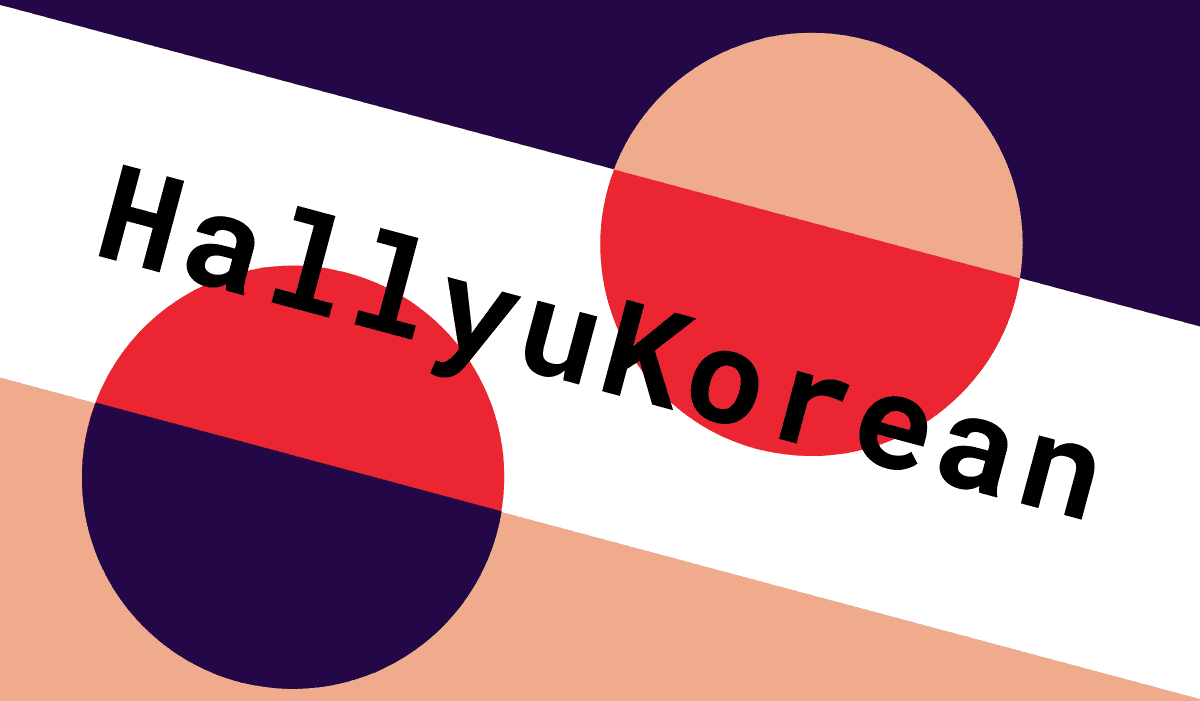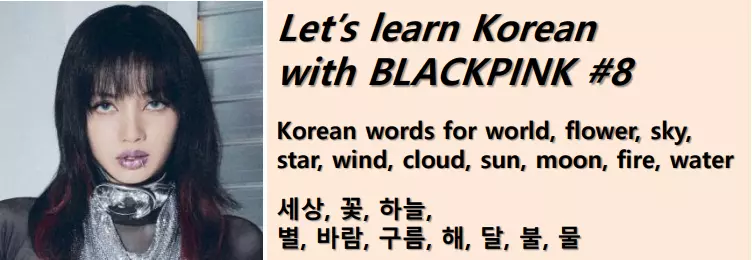Nature Words in Korean : 세상, 꽃, 하늘, 별, 바람, 구름, 해, 달, 불, 물
Let’s learn Nature Words in Korean with BLACKPINK lyrics.
Click the play button below to listen to all the BLACKPINK lyrics used in this post.
세상 [se-sang] world
세상 저 끝까지 가볼래
se-sang jeo kkeut-kka-ji ga-bol-lae
I wanna go to the end of the world
*세상(world) +
저(that) +
끝(end) + 까지(until) +
가볼래(가다(go) + ~아보다(try) + ~ㄹ래(would like to))
(*까지 after a place name means ‘up to the end of a certain area’.
‘~에서’ or ‘~부터’ means ‘from’.
‘~까지’ means ‘to’ or ‘until’.
Verb stem + 아/어보다 expresses trying out or experiencing an action.
~ㄹ/을래(요) can be used to indicate that the speaker wants to do something.)
꽃 [kkot] flower
자 오늘 밤이야. 난 독을 품은 꽃
ja o-neul ba-mi-ya. nan do-geul pu-meun kkot
It’s tonight, I’m a venomous flower
자(okay, now) +
오늘(today) +
밤(night) + 이야(be, =이다) +
난(나(I) + 는(topic particle), =난) +
독(poison) + 을(object particle) +
품은(품다(embrace) + 은(noun modifier)) +
꽃(flower)
(*You can use 자 at the beginning of a sentence to indicate that you want to start talking about something else or doing something else.)
하늘 [ha-neul] sky
별 [byeol] star
하늘의 별이라도 따주겠다 말해
ha-neu-rui byeo-ri-ra-do tta-ju-get-da mal-hae
Tell me you’ll pick me a star in the sky
*하늘(sky) + 의(of) +
별(star) +
이라도(even) +
따주겠다(따다(pick) + 주다(give) + 겠다(will, future tense))
말해(말(talk) + 하다(do))
(*For the future tense, you can use ~(으)ㄹ 거예요 / ~ㄹ 게요/ ~겠어요.
In some cases, nouns can be turned into verbs by simply adding the verb 하다 (to do, to be).
하다 [hada] (to do) is the dictionary form and there are several conjugations of 하다 in Korean.
1)해라[haera] 2)해[hae] 3)해요[haeyo] 4)하십시오[hasipsio]
해요, 해 are informal and are usually used in everyday conversation.
The politeness level is 1 < 2 < 3 < 4.
해요, 해 can both be used as imperative or declarative depending on the context.)
바람 [ba-ram] wind
시원한 바람 부는 창가에 앉아 먼 하늘 바라보며 너를 그려 난
si-wo-nan ba-ram bu-neun chang-ga-e an-ja meon ha-neul ba-ra-bo-myeo neo-reul geu-ryeo nan
I sit by the window where the cool air blows, I think of you as I look at the distant sky
*시원한(시원하다(to be cool) + ㄴ(noun modifier)) +
바람(wind) +
부는(불다(blow) + 는(noun modifier)) +
창(window) + 가(the edge) + 에(to) +
앉아(앉다(sit) + ~아(and, then)) +
먼(멀다(be far) + ㄴ(noun modifier)) +
하늘(sky) +
바라보며(바라보다(look at) + ~며(while)) +
너(you) + 를(object particle) +
그려(miss, draw) +
난(나(I) + 는(topic particle), =난)
(*Word order is important for understanding English sentences, while particles (e.g. 은/는/이/가/을/를) are important for understanding Korean sentences.
It is important to note that in Korean the verb is at the end of the sentence, which is different from the order in English.
The following is more common, but because it’s lyrics, the subject may be backwards.
난(subject) 시원한 바람 부는 창가에 앉아 먼 하늘 바라보며 너를(object) 그려(verb)
When verb stem + ~아/어(서) is used to connect two clauses, the action in the first clause and the action in the second clause occur in the order in which they are said.
~(으)며 means ‘while’, ~(으)면서 means to do two things at the same time.)
구름 [gu-reum] cloud
해 [hae] sun
구름 건너편엔 아직 밝은 해
gu-reum geon-neo-pyeo-nen a-jik bal-geun hae
The sun is still bright across the clouds
*구름(cloud) +
건너편엔(건너편(the other side) + 엔(at, to, =에는)) +
아직(still) +
밝은(밝다(to be bright) + 은(noun modifier)) +
해(the sun)
달 [dal] moon
달이 뜨고 별이 뜨면 춤추는 body
da-ri tteu-go byeo-ri tteu-myeon chum-chu-neun body
When the moon and stars rise, our body dances
*달(moon) + 이(subject particle) +
뜨고(뜨다(rise) + ~고(and)) +
별(star) + 이(subject particle) +
뜨면(뜨다(rise) + ~(으)면(a connective ending used when speaking hypothetically)) +
춤추는(춤추다(dance) + 는(noun modifier)) +
body
불 [bul] fire
넌 불 보듯이 뻔해
neon bul bo-deu-si ppeon-hae
You’re as obvious as fire
[You’re so predictable]
*넌(너(you) + 는(topic particle), =넌) +
불(fire) +
보듯이(보다(see) + 듯이(as)) +
뻔해(to be obvious)
(*~듯이 is a connective ending used when the following statement is almost the same as the preceding statement.)
물 [mul] water
물 만난 물고기
mul man-nan mul-go-gi
a fish in water
*물(water) +
만난(만나다(meet) + ㄴ(noun modifier)) +
물고기(fish)
Grammar Reference
*Adjective[verb] stem + ㄴ/은/는/을 + noun : noun that adjective[verb]
ex) 품은 꽃 : 품은(품다(embrace) + 은(noun modifier)) + 꽃
먼 하늘 : 먼(멀다(be far) + ㄴ(noun modifier)) + 하늘(sky)
밝은 해 : 밝은(밝다(to be bright) + 은(noun modifier) + 해(the sun)
춤추는 body : 춤추는(춤추다(dance) + 는(noun modifier)) + body
만난 물고기 : 만난(만나다(meet) + ㄴ(noun modifier) + 물고기(fish)
ㄴ/은/는/을 is added to verbs and adjectives to make them work as noun modifiers.
The most common Korean particles are listed below.
Subject particle: 이 / 가
Topic particle: 은 / 는
Object particle: 을 / 를
이, 은, 을 for nouns ending with a consonant, 가, 는, 를 for nouns ending with a vowel.
| 이/가 | 은/는 | 을/를 | |
| 세상 | 세상이 | 세상은 | 세상을 |
| 꽃 | 꽃이 | 꽃은 | 꽃을 |
| 하늘 | 하늘이 | 하늘은 | 하늘을 |
| 별 | 별이 | 별은 | 별을 |
| 바람 | 바람이 | 바람은 | 바람을 |
| 구름 | 구름이 | 구름은 | 구름을 |
| 해 | 해가 | 해는 | 해를 |
| 달 | 달이 | 달은 | 달을 |
| 불 | 불이 | 불은 | 불을 |
| 물 | 물이 | 물은 | 물을 |

